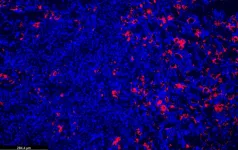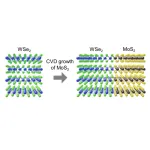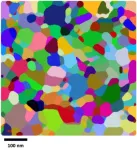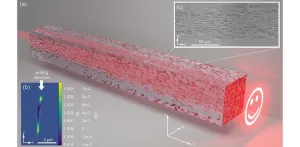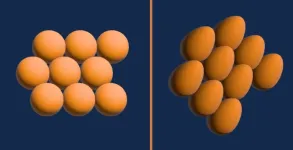(Press-News.org) A discovery about gene variants of an inflammation ‘brake’ brings scientists a step closer to personalised treatment for patients at risk of kidney disease and kidney failure.
Researchers at the Garvan Institute of Medical Research, University of New South Wales, Sydney and Westmead Hospital, found that common genetic variants of TNFAIP3, which increase inflammation in the body, can paradoxically protect the kidneys from damage in the short term.
“We wanted to investigate whether inherited differences in how people regulate inflammation could lead to better or worse kidney health outcomes,” says Professor Shane Grey, senior author of the paper and Head of the Transplant Immunology Lab at Garvan.
“We focused on the TNFAIP3 gene, which produces a protein called A20 that acts as a ‘brake’ on inflammation. Common variants of TNFAIP3 have been linked to autoimmune disease, but their role in kidney disease was unknown. Our discovery that some genetic variants can be protective against inflammation could lead to a simple genetic test that helps predict the risk of kidney disease for patients.”
Unexpected protective effect of pro-inflammatory variant
Acute kidney injury – a sudden and rapid decline in kidney function that is in part caused by inflammation – is an important risk factor for progression to chronic kidney disease, a major health problem affecting approximately one in 10 Australians. Currently there are limited treatment options for acute kidney injury, and imprecise tools to predict who is most at risk of poor recovery or kidney failure.
The team first investigated how different TNFAIP3 variants influence A20's function, finding a series of rare variants that reduced its anti-inflammatory effect. They then tested the effects of one of the variants that promotes inflammation during kidney injury in a mouse model.
“Despite increasing inflammation, this rare variant surprisingly protected the kidneys from injury. We found this protection to be due to another of A20’s functions: preventing cells from self-destructing,” says Professor Natasha Rogers, nephrologist and Head of Transplantation at Westmead Hospital, who co-led the study.
“Our study indicates that these ‘hot’ TNFAIP3 variants can alter the outcome of kidney injury, and they do so through complex effects on inflammation and cell survival.”
The findings are published in the journal Kidney International.
New treatment approaches on the horizon
“More work is needed, but these findings bring us closer to being able to predict who is at risk of poor kidney recovery, and open personalised treatment approaches,” says Professor Grey.
The study could lead to a simple genetic test to allow doctors to determine whether an individual carries a ‘hot’ version of the inflammation control gene, giving families greater certainty about their risk factors.
“By gaining a better understanding of how variants of the TNFAIP3 gene influence kidney health, this research brings us closer to precision diagnostics and tailored treatments for acute kidney injury,” says Professor Grey. “Rather than a one-size-fits-all approach, we may be able to determine the best way to monitor a patient’s condition based on their variant of TNFAIP3, and personalise interventions to boost their kidney recovery and long-term health.”
--ENDS--
The research was supported by funding from the National Health and Medical Research Council of Australia, the Rebecca L Cooper Medical Research Foundation, and the Sydney Medical School Foundation.
Professor Shane Grey is Head of the Transplantation Immunology Laboratory at Garvan, Head of the School of Biotechnology and Biomolecular Sciences at UNSW Sydney and a Conjoint Associate Professor at St Vincent’s Clinical School, UNSW Sydney. Professor Natasha Rogers is a Conjoint Professor at the University of Sydney, Senior Staff Specialist in Nephrology and Transplantation at Western Sydney Local Health District, and Head of the Kidney Injury Laboratory at the Westmead Institute for Medical Research.
END
Inflammation ‘brake’ gene may help reveal outcomes of kidney disease
A gene that controls the cut-off switch for kidney inflammation could pave the way for more precise disease diagnostics and personalized treatments
2023-04-23
ELSE PRESS RELEASES FROM THIS DATE:
Too much insulin can be as dangerous as too little
2023-04-22
Just over a century has passed since the discovery of insulin, a time period during which the therapeutic powers of the hormone have broadened and refined. Insulin is an essential treatment for type 1 diabetes and often for type 2 diabetes, as well. Roughly 8.4 million Americans use insulin, according to the American Diabetes Association.
One hundred years of research have greatly advanced medical and biochemical understanding of how insulin works and what happens when it is lacking, but the reverse, how potentially fatal insulin hyper-responsiveness is prevented, has remained a persistent mystery.
In a new study, published in the April 20, 2023 online edition ...
From sheets to stacks, new nanostructures promise leap for advanced electronics
2023-04-22
Tokyo, Japan – Scientists from Tokyo Metropolitan University have successfully engineered multi-layered nanostructures of transition metal dichalcogenides which meet in-plane to form junctions. They grew out layers of multi-layered structures of molybdenum disulfide from the edge of niobium doped molybdenum disulfide shards, creating a thick, bonded, planar heterostructure. They demonstrated that these may be used to make new tunnel field-effect transistors (TFET), components in integrated circuits with ultra-low power consumption.
Field-effect transistors ...
How alcohol consumption contributes to chronic pain
2023-04-21
LA JOLLA, CA—Chronic alcohol consumption may make people more sensitive to pain through two different molecular mechanisms—one driven by alcohol intake and one by alcohol withdrawal. That is one new conclusion by scientists at Scripps Research on the complex links between alcohol and pain.
The research, published in the British Journal of Pharmacology on April 12, 2023, also suggests potential new drug targets for treating alcohol-associated chronic pain and hypersensitivity.
“There is an urgent need to better ...
Want to make better materials? Read between the lines. Or the “grain boundaries,” as they’re known in materials science.
2023-04-21
The orientations of these infinitesimally small separations between individual “grains” of a polycrystalline material have big effects. In a material such as aluminum, these collections of grains (called microstructures) determine properties such as hardness.
New research is helping scientists better understand how microstructures change, or undergo “grain growth,” at high temperatures.
A team of materials scientists and applied mathematicians developed a mathematical model that more accurately describes such microstructures by integrating data that can be identified from highly magnified ...
New injectable cell therapy developed by WFIRM scientists could resolve osteoarthritis
2023-04-21
WINSTON-SALEM, NC, April 21, 2023 – Wake Forest Institute for Regenerative Medicine (WFIRM) scientists have created a promising injectable cell therapy to treat osteoarthritis that both reduces inflammation and also regenerates articular cartilage.
Recently identified by the Food and Drug Administration as a public health crisis, osteoarthritis affects more than 520 million people worldwide who deal with pain and inflammation. Osteoarthritis is typically induced by mechanical or traumatic stress in the joint, leading to damaged cartilage that cannot be repaired naturally.
“Without better understanding of what drives the initiation and progression of osteoarthritis, effective treatment ...
New approach to developing efficient, high-precision 3D light shapers
2023-04-21
Modern-day technologies like optical computing, integrated photonics, and digital holography require light signals to be manipulated in three dimensions. To achieve this, it is necessary to be able to shape and guide the flow of light according to its desired application. Given that light flow within a medium is governed by the refractive index, specific tailoring of the refractive index is needed to realize control of the light path within the medium.
To this end, scientists have developed what are called “aperiodic photonic ...
New McCombs Award honors Herb Miller
2023-04-21
New McCombs Award Honors Herb Miller
Professional Faculty Impact Award recognizes exceptional contributions of teaching, service, and mentorship.
Associate Professor of Instruction Herb Miller is the namesake and the first recipient of the new McCombs School of Business Marketing Department Herbert A. Miller Jr. Professional Faculty Impact Award.
The award was made possible by William Cunningham, who served as McCombs dean, UT Austin president, and University of Texas System chancellor, as a way to recognize and honor the professional faculty in the department of marketing.
“In ...
Putting hydrogen on solid ground: Simulations with a machine learning model predict a new phase of solid hydrogen
2023-04-21
Hydrogen, the most abundant element in the universe, is found everywhere from the dust filling most of outer space to the cores of stars to many substances here on Earth. This would be reason enough to study hydrogen, but its individual atoms are also the simplest of any element with just one proton and one electron. For David Ceperley, a professor of physics at the University of Illinois Urbana-Champaign, this makes hydrogen the natural starting point for formulating and testing theories of matter.
Ceperley, also a member of the Illinois Quantum ...
Researchers develop safety monitoring system for construction sites
2023-04-21
University of Houston computer scientists have developed a new system to keep construction workers safe at job sites. Their findings and process are laid out in a study published in the research journal Applied Sciences.
According to the Occupational Safety and Health Administration, 4,764 workers died on the job in 2020. Employees in construction and extraction occupations accounted for 20% of those deaths. Many were struck by a vehicle or mobile machinery on construction sites. Although the construction industry has enlisted the help of safety experts, a great number of fatalities and injuries still occur.
“The point of our research project was to enhance safety of workers ...
Study finds alcohol-related liver disease soared in nearly all states during the pandemic, with one race particularly affected
2023-04-21
BOSTON – Alcohol consumption increased substantially across the United States during the COVID-19 pandemic, but the impact was greatest among American Indian and Alaska Native (AIAN) populations, where deaths from alcohol-associated liver disease were six times those of white people, according to a study by Massachusetts General Hospital (MGH), a founding member of Mass General Brigham (MGB). The disproportionately high mortality rate reflects not just the pandemic, but a systemic failure of supportive health care and lack of critical resources for AIAN populations ...
LAST 30 PRESS RELEASES:
Effectiveness of exercise to ease osteoarthritis symptoms likely minimal and transient
Cost of copper must rise double to meet basic copper needs
A gel for wounds that won’t heal
Iron, carbon, and the art of toxic cleanup
Organic soil amendments work together to help sandy soils hold water longer, study finds
Hidden carbon in mangrove soils may play a larger role in climate regulation than previously thought
Weight-loss wonder pills prompt scrutiny of key ingredient
Nonprofit leader Diane Dodge to receive 2026 Penn Nursing Renfield Foundation Award for Global Women’s Health
Maternal smoking during pregnancy may be linked to higher blood pressure in children, NIH study finds
New Lund model aims to shorten the path to life-saving cell and gene therapies
Researchers create ultra-stretchable, liquid-repellent materials via laser ablation
Combining AI with OCT shows potential for detecting lipid-rich plaques in coronary arteries
SeaCast revolutionizes Mediterranean Sea forecasting with AI-powered speed and accuracy
JMIR Publications’ JMIR Bioinformatics and Biotechnology invites submissions on Bridging Data, AI, and Innovation to Transform Health
Honey bees navigate more precisely than previously thought
Air pollution may directly contribute to Alzheimer’s disease
Study finds early imaging after pediatric UTIs may do more harm than good
UC San Diego Health joins national research for maternal-fetal care
New biomarker predicts chemotherapy response in triple-negative breast cancer
Treatment algorithms featured in Brain Trauma Foundation’s update of guidelines for care of patients with penetrating traumatic brain injury
Over 40% of musicians experience tinnitus; hearing loss and hyperacusis also significantly elevated
Artificial intelligence predicts colorectal cancer risk in ulcerative colitis patients
Mayo Clinic installs first magnetic nanoparticle hyperthermia system for cancer research in the US
Calibr-Skaggs and Kainomyx launch collaboration to pioneer novel malaria treatments
JAX-NYSCF Collaborative and GSK announce collaboration to advance translational models for neurodegenerative disease research
Classifying pediatric brain tumors by liquid biopsy using artificial intelligence
Insilico Medicine initiates AI driven collaboration with leading global cancer center to identify novel targets for gastroesophageal cancers
Immunotherapy plus chemotherapy before surgery shows promise for pancreatic cancer
A “smart fluid” you can reconfigure with temperature
New research suggests myopia is driven by how we use our eyes indoors
[Press-News.org] Inflammation ‘brake’ gene may help reveal outcomes of kidney diseaseA gene that controls the cut-off switch for kidney inflammation could pave the way for more precise disease diagnostics and personalized treatments
